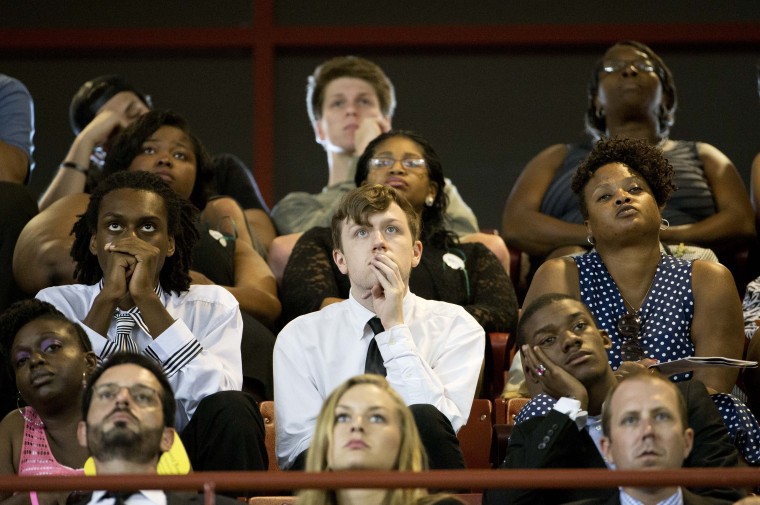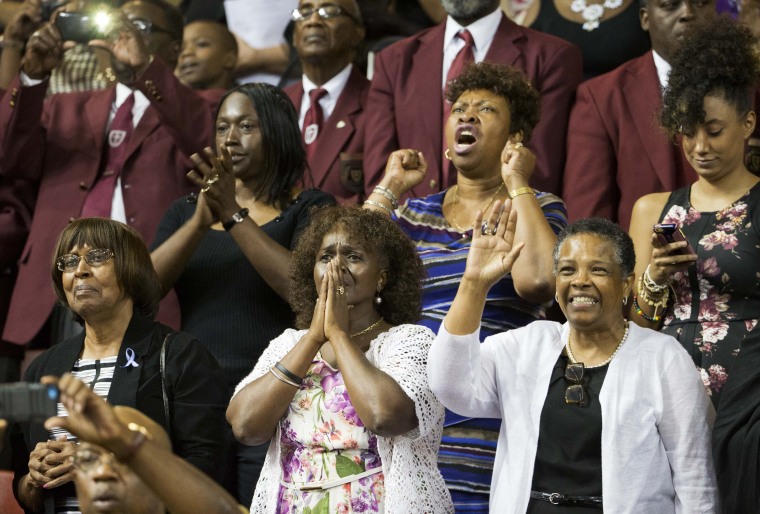Unbound by term limits and perhaps feeling the urgency of his remaining time in office, President Barack Obama on Friday made an impassioned plea to the country not to return to the comfortable silence before nine men and women were slain in Charleston, but to finally come together to right history’s wrongs and address poverty, gun violence and systemic racism.
His bold remarks capped a week of transformative change in America that has also witnessed the remarkable evolution of its commander-in-chief.
On Monday, Obama made headlines for using the N-word in discussing the nation’s need for continued progress on race relations during a podcast. In the hourlong interview, Obama signaled that, more than six years into office, he is now “fearless,” and described the feeling as “liberating.”
"Every time something like this happens, somebody says we have to have a conversation about race. We talk a lot about race. There’s no shortcut. And we don’t need more talk."—President Obama
He headed to Charleston to deliver the eulogy for the Rev. Clementa Pinckney immediately after taking a brief moment to celebrate the Supreme Court’s historic decision to recognize same-sex marriage as equal under the law nationwide—a position Obama came to after taking office.
“Sometimes there are days like this when that slow steady effort is rewarded with justice that arrives like a thunderbolt,“ said Obama, speaking in the Rose Garden on Friday morning. “Slowly, they made an entire country realize that love is love.”
It was the second victory Obama celebrated from the high court, which also this week affirmed the constitutionality of his legacy-sealing healthcare law.
Hours later in Charleston, his faith and African-American roots on full display, Obama spoke of confronting injustice as a means of “expressing God’s grace” as a nation before the extraordinary moment when he led more than 5,000 clergy, politicians and mourners in the spiritual “Amazing Grace.”
Striking a balance between sermon and policy, the 40-minute eulogy included some of Obama’s boldest comments on race since he became president.
In his eulogy of Pinckney—pastor of Emanuel AME Church and a state senator whom the president met on the campaign trail during Obama’s run to become the country’s first black president—he described shooter Dylann Roof as “blinded by hate,” but said the alleged killer’s actions opened the eyes of America.
“Out of this terrible tragedy, God has visited grace upon us,” Obama said. “For he has allowed us to see where we’ve been blind. He’s given us the chance, where we’ve been lost, to find our best selves. We may not have earned it with our rancor and complacency and shortsightedness and fear of each other, but we got it all the same. It is up to us now to make the most of it, to receive it with gratitude and to prove ourselves worthy of this gift.”
Obama spoke of the example of Pinckney and his eight church members, who lived lives of faith in service to others. For Pinckney, it was an approach he took to his ministry and politics, working to help better the lives of those he pastored and represented as a legislator.
“He represented … a place that has long been one of the most neglected in America,” Obama said, with poor schools, hungry children, and sick people who don’t receive care.
"A place that needed somebody like Clem.”

Obama addressed a bipartisan crowd that included Republican Gov. Nikki Haley, Republican House Speaker John Boehner, Republican Sens. Lindsey Graham and Tim Scott, 2016 Democratic presidential candidate Hillary Clinton, Democratic Rep. James Clyburn, and members of Congress and the South Carolina Legislature where Pinckney was first elected to the House of Representatives at age 23.
As a member of the minority party in the GOP-controlled statehouse, Obama pointed out that Pinckney faced long odds in the state Senate, casting lonely votes and championing causes that rarely succeeded. But he remained focused, embodying “a politics that was neither mean nor small.”
“It’s true a flag did not cause these murders, but people from all walks of life—Republicans and Democrats—now acknowledge the flag has always represented more than just ancestral pride."—President Obama
“He never gave up, he stayed true to his convictions,” Obama said. “He conducted himself quietly and kindly and diligently. He encouraged progress not by pushing his ideas along but by seeking out your ideas, partnering with you to make things happen.”
The president praised Pinckney’s beloved Mother Emanuel as the epitome of the black church, which the president referred to as “our beating heart.” Repeatedly, Obama included himself in describing the church’s meaning and relevance.
“The church is and always has been the center of African-American life,” Obama said. “A place to call our own in too often hostile world, a sanctuary from so many hardships … The place where our dignity as a people is inviolate.”
The African Methodist Episcopal tradition was on full display during the service, which lasted nearly four hours—with dozens of bishops on the dais, an organist accompanying speakers, and a full choir singing a catalogue of traditional black hymns, including “How I Got Over,” and “Going Up Yonder,” and “Lift Ev’ry Voice and Sing,” known as the Negro national anthem.
The president also praised Republican Gov. Nikki Haley for reversing her position and calling for the removal of the confederate battle flag earlier this week—a move followed by other Republican leaders in states across the South.
“For too long, we were blind to the pain that the confederate flag stirred in too many of our citizens,” Obama said. “It’s true a flag did not cause these murders, but people from all walks of life—Republicans and Democrats—now acknowledge the flag has always represented more than just ancestral pride. For many, black and white, that flag was a reminder of systemic oppression and subjugation.”
Obama went on to say that taking down the flag is not an insult to confederate veterans, but a recognition that the cause they fought for—which, he stated plainly, was slavery—was wrong.
“It would be a modest but meaningful balm for so many unhealed wounds,” Obama said. “It would be an expression of the amazing changes that have transformed this state and this country for the better because of the work of so many people of goodwill. But I don’t think God wants us to stop there.”
Obama spoke of how Americans have too long “been blind to the way past injustices continue to shape the present” and called for the country to fix languishing schools, poverty, the unemployment gap among African-Americans, and the lingering legacy of racism—including racial bias that affects everything from hiring to the criminal justice system.

“Every time something like this happens, somebody says we need to have a conversation about race,” Obama said. “We talk a lot about race. We don’t need more talk.
"It would be a betrayal of everything Rev. Pinckney stood for, if we allowed ourselves to slip into comfortable silence again," Obama continued, "Once the eulogies have been delivered, once the tv cameras move on, to go back to business as usual. That’s what we so often do to avoid uncomfortable truths about the prejudice that still infects our society. To settle for symbolic gestures without following up with the hard work of more lasting change -- that’s how we lose our way again."